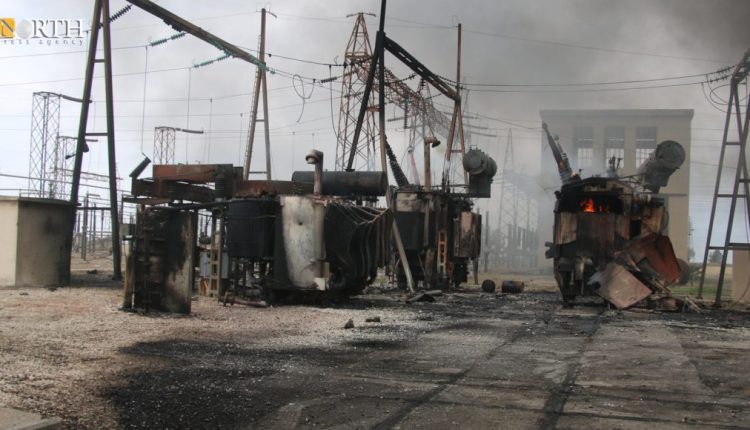
By Zana al-Ali
RAQQA, Syria (North Press) – Activists in Raqqa governorate, northern Syria, believe that the repeated Turkish airstrikes and attacks on the region of Northeast Syria, which include the destruction of infrastructure and essential services facilities, constitute an attack on the population of the region.
Turkey launched 122 airstrikes, including 62 drone strikes and 22 airstrikes by warplanes, targeting 89 sites in the region from the beginning of 2024 up to Jan. 15.
The airstrikes have primarily focused on power stations and substations, oil and gas facilities, as well as the centers and checkpoints of the Internal Security Forces in North and East Syria (Asayish).
According to Ahmad al-Hassan, a civil activist in Raqqa, the situation in Northeast Syria has been difficult for the past two years. However, the recent Turkish attack has made the situation even worse, causing further distress and frustration in the region.
Al-Hassan further explained that Turkey is deliberately targeting vital infrastructure, such as oil companies, power stations, and fuel transportation vehicles, which are essential for securing fuel for the local population, especially in the cold winter months.
He believes that Turkey by attacking these essential service and oil facilities are attacking the region’s residents.
“The consequences of these airstrikes are too clear, with widespread power outages, skyrocketing fuel prices, a thriving black market, and restricted movement for the local population,” he said.
Al-Hassan emphasized that the living conditions have deteriorated sharply, while the international community remains silent and turns a blind eye to these relentless attacks.
Turkish drones targeted with seven strikes the power plants in Kobani, Ain Issa, Amuda, Tirbe Spiyeh (al-Qahtaniya), Qamishli, and Derbasiyah. As a result, these stations went out of service, according to statistics released by the AANES on Jan.15.
Turkey also carried out seven airstrikes on oil facilities. The targeted locations included the Sweidiya gas plant, the Awda oil field, the Taflah Refinery station, and another oil facility in the village of Gire Pire, near the town of Tirbe Spiyeh. Furthermore, warehouses used for oil field maintenance in northeastern Syria were also hit.
While Ahmad Sheikho, the coordinator in the DOZ local organization in Raqqa, believes that Turkey, by these ongoing airstrikes and targeting of northeast Syria, is exporting its domestic problems.
Sheikho points out that these airstrikes on vital infrastructure and services, including oil and gas plants, power stations, health centers, and mills, destabilize the region.
He asserts that by doing so, Turkey is providing an opportunity for the resurgence of the Islamic State (ISIS) since it is seen as a sponsor of ISIS.
The activist’s hopes that the Global Coalition will exert pressure to put an end to Turkish violations and airstrikes in the region.
Manaf al-Asaad, a civil activist, emphasized that the recent Turkish attacks on the region, coupled with the absence of humanitarian solutions or intervention by humanitarian organizations, negatively affected the lives of the region’s residents.
“After enduring years of war that have already devastated the residents, the Turkish attacks are further targeting the already fragile service sectors, resulting in the complete erosion of basic living conditions,” al-Assad concluded.
